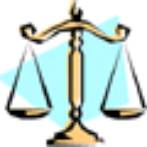|
from The Worldview Literacy Book copyright 2009 back to worldview theme #31 |
| Discussion
Democracies can be direct—where a majority of citizens' votes
directly make decisions—or
representative—where voters elect individuals to politically lead and
represent them in a legislature and vote on their behalf.
Modern democracies are typically of the latter type and tend to
have three branches of government: 1) the legislative, consisting
of elected representatives who make laws, 2) the executive, including
the head of the government, responsible for enforcing laws and the daily
functioning & administration of the state, and 3) the judicial,
consisting of courts, judges, etc., which interprets the law and
administers justice. Separation
of power gives each branch independence and provides checks and balances
against abuse. As Figures #31a, #31b suggest, democracy
is built on a foundation that includes 1) rule of law, and 2) a feedback
process in which citizen voters voice approval or disapproval—the
effectiveness of which is aided by free inquiry (theme #30) and
education. Arguments that democracy won't work without well-educated
citizens began most notably with Plato (see Discussion, theme #20).
Those who respect "Education for Democracy" support
public education: basic, tuition-free education supported by
government-levied taxes, structured to maintain high standards &
public accountability, promising equal opportunities regardless of race,
religion, or ability, and providing students with civics education
relevant to their citizenship. As described in the 2005 U.S. Department of State booklet Principles of
Democracy, such education should promote "knowledge
of national and world history and of basic democratic principles"
and "democratic norms and practices should be taught in order for
people to understand and appreciate their opportunities and
responsibilities as free citizens."
For this, the government booklet's authors offer the following
rationale: "Every society transmits its habits of mind, social
norms, culture, and ideals from one generation to the next.
There is a direct connection between education and democratic
values: in democratic societies, educational content and practice
support habits of democratic governance.
This educational transmission process is vital in a democracy
because effective democracies are dynamic, evolving forms of government
that demand independent thinking by the citizenry.
The opportunity for positive social and political change rests in
citizens' hands. Governments should not view the education system as a
means to control information and to indoctrinate students." This
statement provides some idea as to where the balance has been struck in
a long-time debate. In his 1986
book The American School 1642—1985, Joel Spring depicted the
battle as pitting those "who believed schooling should mold the
virtuous citizen" against those "who believed schooling should
provide the tools for the exercise of freedom."
In the first camp people advocate "a school system that
imposes morality, emphasizes |
Discussion—continued patriotism, teaches respect for
authority, and inculcates basic political values," and in the
second "schooling in a democratic society should provide the
intellectual tools to all people that will enable them to select their
own moral and political values." Those on the extreme right flank
of the first position would be comfortable with schools dispensing an
idealized, cleaned up retelling of the American story.
This would glorify American military history, exceptionalism,
inspire loyal devotion, and provide a heavy dose of God &Christian
morality. The second camp
would view it as dishonest propaganda, violating constitutional
guarantees regarding separation of church and state.
Both the "Education for
Democracy" theme and—perhaps surprisingly—the government
booklet's position tilt toward the second position.
The booklet's appreciation of the "dynamic, evolving"
nature of democracy recalls the views of American educational
philosopher John Dewey: "The keynote of democracy as a way of
life...[is] the necessity for the participation of every mature human
being in the formation of values that regulate the living of men
together." He argued
that schools should serve communities as "social centers" and
provide education "which gives individuals a personal interest in
social relationships and control, and the habits of the mind which
secure social changes without introducing disorder."
Many are uncomfortable with public
schools. Some parents fear for their kid's physical
safety and opt for private schools.
Others fear religious values they have worked to inculcate will
be corrupted at public schools and choose religious schools or home
schooling. Those
comfortable with military values (theme #46B) may go with military
schools. Many laissez faire
capitalists & libertarians (themes #19, 50A) believe governments
should not be involved in education.
They call for free market competition among schools.
Some such calls advocate programs to provide vouchers to finance
students attending private (including religious) schools. Many fear this
will weaken public education—by siphoning off funding and bright
students—and eventually end it. Short
of ending it altogether, some believe that public education, supported
by modern free enterprise based democracies, ought to emphasize
preparing students for roles as workers and consumers. They urge more
business and vocational training, and less liberal education.
Finally, "decentralized society
advocates" (theme #48) and others prefer local control of schools. They believe the citizens of a community—including those whose taxes go to
support the local school—should have the dominant say in what school
policies are and what is taught. Local
citizens exercise this control by electing school board members.
Typically, to one extent or another, authorities at higher levels
of government (county, state, or national) wrest at least some control
away from the community where the school is located.
|
|
Figure #31a: The Rule of Law
from http://
democracy.america.gov/democracy.html)
The Scales of Justice They weigh the strength of arguments for or against some appeal to the rule of law. They are linked to the Roman goddess Justitia, often depicted holding them in one hand, and a sword—representing the power of reason and justice—in the other |
Figure
#31b
|
|||||||||||||
